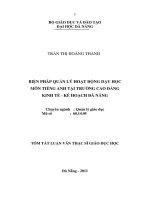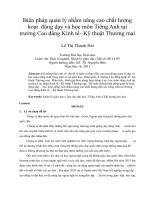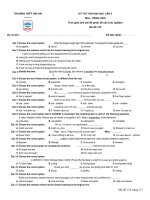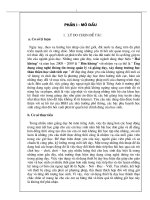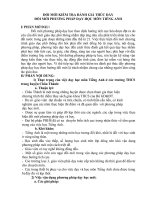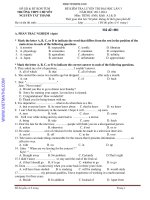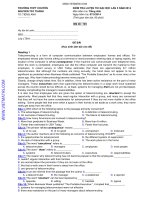Nội dung học môn tiếng Anh
Bạn đang xem bản rút gọn của tài liệu. Xem và tải ngay bản đầy đủ của tài liệu tại đây (124.27 KB, 6 trang )
<span class='text_page_counter'>(1)</span><div class='page_container' data-page=1>
<b>GRADE 10</b> <b>REVIEW</b>
<b>UNIT 9 – UNIT 16</b>
<b>I.</b> <b>Conditional sentence type 2:</b>
Câu điều kiện loại 2 dùng để diễn tả một sự việc khơng có thật trong hiện tại (unreal present)
E.g.: Because he doesn’t have more free time, he doesn’t travel around the world.
If he had more free time, he would travel around the world.
<b>IF CLAUSE</b> <b>MAIN CLAUSE</b>
<b>Past simple</b>
- be were
- verb V + ed / V2
<b>S + could / would / might + V (bare inf.)</b>
1. She doesn’t live in London because she doesn’t know anyone there.
She would ……….
2. He doesn’t apply for the job because he doesn’t have enough qualifications.
If he ……….
3. I don’t have a spare ticket. I can’t take you to the concert
If I ………...
4. They don’t understand the problem. They won’t find a solution.
If they ……….
5. I don’t know her e-mail address, so I can’t tell you.
If I ……….
6. She works in the evening. She has no time to play with her children
If she ……….
7. I am not tall enough to join the basketball team.
If I ………
8. He doesn’t see the signal, so he doesn’t stop his car.
If he ……….
9. Peter gets bad marks because he doesn’t prepare his lessons well.
If Peter ………
10. Mary doesn’t have enough money. She can’t buy a new car.
If Mary ………
<b>II.</b> <b>Conditional sentence type 3:</b>
Câu điều kiện loại 3 dùng để diễn tả một sự việc khơng có thật trong quá khứ (unreal past)
<b> E.g.: He didn’t hurry, so he missed the bus.</b>
If he had hurried, he wouldn’t have missed the bus.
<b>IF CLAUSE</b> <b>MAIN CLAUSE</b>
Past perfect
<b>S + had + p.p. (V3)</b> <b>S + would / could / might / should + have + p.p. (V3)</b>
1. He didn’t prepare for the interview, so he didn’t get the job.
If he ………
2. We came home from our holiday early because we ran out of money.
</div>
<span class='text_page_counter'>(2)</span><div class='page_container' data-page=2>
3. I went to bed late. In the morning I felt tired.
If I ………
4. The house didn’t burn down because the fire brigade came immediately.
The house would ………
5. We left the party late, so we couldn’t get a bus.
If we ………
6. I took the job because I didn’t know how difficult it was .
I wouldn’t ………
7. Ann didn’t pass the entrance examination, so she wasn’t admitted to the university.
If Ann ………
8. The men were wearing protective clothing, so they were all quite safe.
If the men ………
9. It rained yesterday afternoon, so I didn’t go for a walk.
If it ………
10. Joe got a ticket because he was driving too fast.
If Joe ………
<b>III.</b> <b>The passive voice:</b>
<b>E.g.: </b> Shakespeare wrote this play.
This play was written by Shakespeare
<b>Active :</b> S V O
Passive : S BE + Past participle by + agent
1. The factory is producing more and more pollution.
More and more pollution ………
2. Alexander Fleming discovered penicillin in 1928.
Penicillin ………
3. They haven’t cleaned the house for weeks.
The house ………
4. The city council has banned traffic from the city centre.
Traffic ………
5. Somebody will meet you at the bus station.
You ………
6. They are going to build many schools for disabled children.
Many schools ………
7. Mr. John hasn’t taught that course since 1985.
That course ………
8. Is a student pilot flying that airplane?
Is that ………?
9. Alan’s knowledge of art doesn’t impress me.
I …………..………
10. Did Sue knock that vase to the floor?
</div>
<span class='text_page_counter'>(3)</span><div class='page_container' data-page=3>
<b>IV.</b> <b>Wh-questions:</b>
Câu hỏi bắt đầu bằng Wh-questions và buộc phải có thơng tin trả lời cụ thể (khơng dùng yes,
no)
Who
What
When + + S + V?
Where
Why
How
1. She goes to school by bus.
………?
2. Tom studied medicine because he wanted to become a doctor.
………?
3. It’s about 200 metres from here to the central post office.
………?
4. I often go to the English club once a week.
………?
5. We went to Dalat last summer.
………?
6. She often listens to classical music at night because it helps her to feel relaxed.
………?
7. We have English classes on Tuesday, Thursday and Saturday.
………?
8. My father is going to take my younger sister to the zoo next Sunday.
………?
9. Peter left for London on December 5th<sub> .</sub>
………?
10. There are about 50 books on her book-shelf.
………?
<b>V.</b> <b>It was not until … that …:</b>
It was not until ... that + S + V + ed / V2: đề cập đến sự việc xảy ra trong quá khứ
<b>E.g.: The cinema did not become an industry until 1915.</b>
→ It was not until 1915 that the cinema became an industry.
1. I didn’t finish the report until midnight.
→ It was not until ………
2. The manager didn’t return from his holiday until Monday.
→ It was not until ………
3. She didn’t answer his phone call until he had phoned her the third time.
→ It was not until………
4. They didn’t buy the house until the bank had lent them the money.
→ It was not until………
5. Denise didn’t know the truth until we had told her.
auxiliary verbs (do, does, did, …)
be
</div>
<span class='text_page_counter'>(4)</span><div class='page_container' data-page=4>
→ It was not until………
6. The work on the new bridge wasn’t completed until the end of 2004.
→ It was not until………
7. She wasn't allowed to open her presents until her birthday.
→ It was not until………
8. I didn't sleep until midnight.
→ It was not until………
9. She didn't stop learning German until the age of 60.
→ It was not until………
10. They didn’t begin to learn English until 1980.
→ It was not until………
<b>VI.</b> <b>Comparison: </b>
<b>1. Positive form (Dạng so sánh bằng):</b>
<b>E.g.: She is as tall as her sister.</b>
He is as intelligent as his brother.
<b>2. Comparative form (Dạng so sánh hơn):</b>
<b>a. Tính từ ngắn: </b>
<b>E.g.: John is older than Bill.</b>
Bill is heavier than John.
<b>Cách thêm –er vào tính từ: </b>
Tính từ tận cùng là –e, ta chỉ cần thêm –r.
<b>E.g.: large </b> larger
nice nicer
Các tính từ tận cùng bằng một phụ âm, trước nó là một nguyên âm, ta gấp đôi
phụ âm sau cùng trước khi thêm –er.
<b>E.g.: hot </b> hotter
thin thinner
wet wetter
Các tính từ tận cùng bằng –y, ta đổi thành –i rồi thêm –er.
<b>E.g.: heavy </b> heaavier
lucky luckier
<b>Short adjectives: Tính từ ngắn là các tính từ có một vần, hoặc hai vần nhưng tận cùng</b>
bằng các chữ cái: -y, -er, -et, -le, -ow
<b>E.g.: tall, short, hot, cold,…</b>
lucky, sunny, happy, clever, quiet, gentle, narrow, …
<b> </b>
<b> Long adjectives: Tính từ dài là tính từ có hai vần trở lên và khơng thuộc tính từ ngắn</b> .
<b>b. Tính từ dài: </b>
<b>E.g.: A car is more expensive than a motorbike.</b>
3. Superlative form (Dạng so sánh nhất):
<b>a. Tính từ ngắn: </b>
<b>Positive: </b>
AS + ADJECTIVE + AS
<b>Negative: </b>
NOT SO / AS + ADJECTIVE
<b> + </b>
AS
<b>SHORT ADJECTIVE + ER + THAN</b>
<b>MORE + LONG ADJECTIVE + THAN</b>
</div>
<span class='text_page_counter'>(5)</span><div class='page_container' data-page=5>
<b>E.g.: Mexico is the biggest city in the world.</b>
<b>b. Tính từ dài: </b>
<b> E.g.: She is the most intelligent girl in her class.</b>
<b>Ngoại lệ:</b>
<b>Adjective</b>
<b>Comparative</b>
<b>Superlative</b>
good / well
better
the best
bad
worse
the worst
little
less
the least
many / much
more
the most
far
farther
<sub>further</sub>
the farthest
<sub>the furthest</sub>
old
older
<sub>elder</sub>
the oldest
<sub>the eldest</sub>
late
later
the latest
the last
<b>Exercise 1. Complete the sentences. Use the words in the bracket.</b>
1. This book is (thin)……….than that one.
2. He is (studious)……….as his sister.
3. Nobody is (happy)……….than Mary.
4. Nam is (intelligent)……….in our class.
5. Tom is much (strong)………..than I.
6. Her job is (important)………than mine.
7. Which is (high)……….mountain in your country?
8. My computer is not (modern)……….as yours.
9. The ruler is (not, cheap) ………..as the eraser.
10. It was an awful day. It was (bad) ………..day of my life.
<b> Exercise 2. Complete the second sentence so that it has a similar meaning to the first one.</b>
<b>1.</b> Nobody in my family drives as fast as he does.
→ He is……… my family. (THE)
<b>2.</b> My house is bigger than your house.
→ Your house is ……… (AS)
<b>3.</b> The black car is cheaper than the red car.
→ The red car……… (AS)
<b>4.</b> This film is more interesting than that one.
→That film is……… (AS)
<b>5.</b> My kitchen is smaller than yours.
</div>
<span class='text_page_counter'>(6)</span><div class='page_container' data-page=6>
<b>6.</b> My grandmother is older than every one in my family.
→ My grandmother is the ……… my family. (THE)
<b>7.</b> No one in my class is as tall as Tam.
→ Tam is ……… (THE)
<b>8.</b> I can’t cook as well as my mother.
→ My mother can cook ……… (THAN)
<b>9.</b> He does not play tennis as well as Jack.
→ Jack can ……… (THAN)
<b>10.</b>I did not spend as much money as you.
→ You spent ……… (THAN)
<b>11.</b>He is the tallest boy in his class.
→ No one in ……… (AS)
<b>12.</b>This is the most interesting film of all.
→ No other films are ……… (AS)
<b>13.</b>No cars in the world are more expensive than Japanese ones.
→ Japanese cars ……… (THE)
<b>14.</b>This exercise is easier than that one.
→ That exercise is not ……… (AS)
<b>15.</b>He drives more carefully than Jack does.
→ Jack ……… (AS)
<b>16.</b>No one in the group plays football better than he.
→ He is ……… (THE)
<b>17.</b>No hotel in the city is as comfortable as this.
→ This hotel is ……… (THE)
<b>18.</b>Other oceans in the world aren’t as large as the Pacific one.
</div>
<!--links-->



